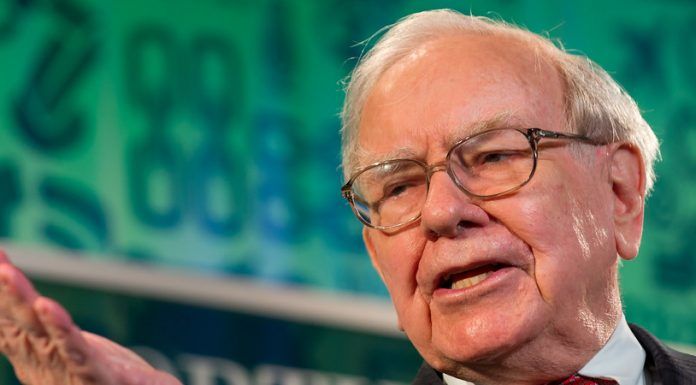(Headline USA) Warren Buffett appeared to be unloading billions of dollars of stock in woke corporations and banking on the prospect that the next administration will bring the out-of-control U.S. economy during the Biden–Harris administration back in line, perhaps even effecting a period of negative inflation.
Buffett is now sitting on more than $325 billion cash after dumping Apple and Bank of America shares this year and continuing to collect a steady stream of profits from all of Berkshire Hathaway’s assorted businesses without finding any major acquisitions.
The specific motives behind enigmatic Buffett’s financial moves remain a mystery, although it would appear to indicate a belief that former President Donald Trump’s recent surge of momentum would usher him back into the White House.
Berkshire said it sold off about 100 million more Apple shares in the third quarter after halving its massive investment in the iPhone maker last quarter.
The remaining stake of roughly 300 million shares was valued at $69.9 billion at the end of September remains Berkshire’s biggest single investment, but it has been cut drastically since the end of last year when it was worth $174.3 billion.
Investors will also be disappointed to learn that Berkshire didn’t repurchase any of its own shares in the quarter.
CFRA Research analyst Cathy Seifert claimed shareholders would wonder why Buffett was continuing to accumulate so much cash. “Are they more pessimistic about the future economic and market picture than perhaps others are?” she said.
Federal Election Commission records show that Seifert has made at least six contributions totaling $975 to Democrat campaigns—four of them specifically for the Biden–Harris campaign—since 2020.
While anxieties exist that radical leftists will take a Trump landslide poorly, perhaps resulting in a period of political violence and instability, investors appear optimistic about a Trump presidency helping to revitalize the flailing economy.
Buffett, who is also a major Democrat donor, claimed at the annual meeting in May that part of why he started selling some of his Apple shares was that he expected tax rates to go higher in the future.
But Edward Jones analyst Jim Shanahan said he wonders if part of the reason Buffett started selling Apple is tied to last year’s death of Vice Chairman Charlie Munger because the sales started shortly after Munger’s death.
Shanahan said Buffett has never been as comfortable with technology businesses as his longtime partner was.
“If Charlie Munger were still alive, perhaps he wouldn’t have sold down the position quite as aggressively—maybe at all,” Shanahan said.
Berkshire said Saturday that investment gains again drove its third-quarter profits skyward to $26.25 billion, or $18,272 per Class A share. A year ago, unrealized paper investment losses dragged the Omaha, Nebraska-based conglomerate’s earnings down to a loss of $12.77 billion, or $8,824 per Class A share.
Buffett has long recommended that investors pay more attention to Berkshire’s operating earnings if they want to get a good sense of how the businesses it owns are doing because those numbers exclude investments.
Berkshire’s bottom-line profit figures can vary widely from quarter to quarter along with the value of its investments regardless of whether the company bought or sold anything.
By that measure, Berkshire said its operating earnings were only down about 6% at $10.09 billion, or $7,023.01 per Class A share. That compares to last year’s $10.8 billion, or $7,437.15 per Class A share.
The four analysts surveyed by FactSet Research predicted that Berkshire would report operating earnings of $7,335.11 per Class A share.
Berkshire’s revenue didn’t change much at $92.995 billion. A year ago, it reported $93.21 billion revenue. That number was ahead of the $92.231 billion revenue that three analysts surveyed by FactSet predicted.
Berkshire owns an assortment of insurance businesses, including Geico, along with BNSF railroad, several major utilities and a varied collection of retail and manufacturing businesses, including brands like Dairy Queen and See’s Candy.
One of Berkshire’s insurers, Guard, reported some additional losses on previous years after managers reassessed its policies.
Berkshire did resolve one mystery from the quarter by spelling out how much it paid to acquire the rest of the shares in its utility business from the estate of former Berkshire board member Walter Scott.
Berkshire said it paid $2.4 billion cash, issued $600 million in debt and gave the Scott family Class B Berkshire shares worth a little over $1 billion. So the total compensation was about $4 billion.
That means the Scott family didn’t get nearly as good of a price for their 8% stake in the utilities as when Berkshire Vice Chairman Greg Abel sold his 1% stake in the utility business two years ago for $870 million.
Abel is slated to succeed the 94-year-old Buffett as CEO in the event of his death.
Adapted from reporting by the Associated Press

